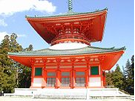
On a recent visit to Japan, I felt a sense of calm amongst the 52 temples which make up the mountain-top settlement of Koyasan. It's a place where Buddhist monks first settled some 1200 years ago and still today they renounce the world in their search for enlightenment.
In this latter-day Shangri-La one feels slightly envious of what appears to be a peaceful, simple existence without the pressures of the modern world.
Yet former Zen monk Sokun Tsushimoto reveals that Buddhist temples have a lot in common with our more traditional western workplaces. In an interview with The Japan Times, he says "When you look at the origin of religion you see that Buddha and Jesus Christ were individuals around whom groups of followers were created". He goes on to say that to maintain the groups and expand and spread their ideas, the subject of money becomes an issue, and pure religious principles can run counter to the needs of the organisation.
He adds "As a result monks end up discussing budgets, the amount of donations they need to collect and how to achieve their targets". Tsushimoto, a high ranking Priest on a fast track to the top walked out to begin an eight year training to become a doctor and has recently qualified. He felt that he could no longer accept the political infighting, the empire building and a target driven culture which did nothing to solve people's real life needs.
We may tut-tut at the Buddhists, but if we are honest we see this kind of thing in organisations large and small all of the time. Leaders and entrepreneurs start new ideas; organisations are good at growing and sustaining them; yet there seems to be a point where the needs of the organisation conflict with those of the customer - and if the health service in Japan is anything like Britain's National Health Service, then Tsushimoto may feel that he has jumped out of the frying pan and into the fire.
How can we create organisations which are free from empire building, infighting and remain truly connected to the customer?
It's an important question. The best businesses and organisations will find a way.
It's something I shall meditate upon.
In this latter-day Shangri-La one feels slightly envious of what appears to be a peaceful, simple existence without the pressures of the modern world.
Yet former Zen monk Sokun Tsushimoto reveals that Buddhist temples have a lot in common with our more traditional western workplaces. In an interview with The Japan Times, he says "When you look at the origin of religion you see that Buddha and Jesus Christ were individuals around whom groups of followers were created". He goes on to say that to maintain the groups and expand and spread their ideas, the subject of money becomes an issue, and pure religious principles can run counter to the needs of the organisation.
He adds "As a result monks end up discussing budgets, the amount of donations they need to collect and how to achieve their targets". Tsushimoto, a high ranking Priest on a fast track to the top walked out to begin an eight year training to become a doctor and has recently qualified. He felt that he could no longer accept the political infighting, the empire building and a target driven culture which did nothing to solve people's real life needs.
We may tut-tut at the Buddhists, but if we are honest we see this kind of thing in organisations large and small all of the time. Leaders and entrepreneurs start new ideas; organisations are good at growing and sustaining them; yet there seems to be a point where the needs of the organisation conflict with those of the customer - and if the health service in Japan is anything like Britain's National Health Service, then Tsushimoto may feel that he has jumped out of the frying pan and into the fire.
How can we create organisations which are free from empire building, infighting and remain truly connected to the customer?
It's an important question. The best businesses and organisations will find a way.
It's something I shall meditate upon.

 RSS Feed
RSS Feed



